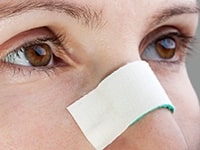What is Sinus/Nasal Surgery?

Sinus and nasal surgery are performed to enlarge the openings that drain the sinuses, in order to effectively treat conditions such as nasal congestion, rhinitis, sinusitis, polyps and others. Patients may turn to surgery after other treatments such as medications, nasal sprays and humidifiers have been unsuccessful in relieving symptoms, or for chronic, recurring conditions. Our practice serves Bayside, Queens, Long Island, and surrounding areas.
Symptoms of Sinus Issues
The symptoms of sinus problems can vary widely depending on the type and severity of each patient’s condition, but often significantly affect a patient’s quality of life. Common symptoms include:
- Facial pain and pressure
- Mucous discharge
- Nasal obstruction
- Fever
- Headache
- Congestion
- Vision disturbances
What are the different types of Sinus Surgery?
There are several different types of sinus surgery, most of which can be performed through minimally invasive techniques that require no incisions and no hospital stay. Some of the most commonly performed procedures include functional endoscopic sinus surgery (FESS), image-guided surgery, and Balloon Sinuplasty.
Does Sinus/Nasal Surgery require anesthesia?
Most sinus and nasal surgeries are usually performed under general anesthesia. Patients usually do not have any bruising or swelling. Our doctors will decide which procedure is best for you after a thorough evaluation of your individual condition.
What our patients have to say
"Was not feeling well and needed an appointment with an ENT quickly. Called Dr. Werber’s Office in the morning and they got me an appointment an hour later. Dr. Werber examined me then suggested an outside test which I scheduled two days later. Upon receiving and analyzing the results he reached out to me in a timely, caring manner. My overall experience in dealing with him and his staff was incredibly positive."
Nasal Obstruction
Breathing problems are often caused by structural blockages leading to the obstruction of airflow through the nose. Such disorders include deviated nasal septum, enlarged turbinates, nasal polyps, and enlarged adenoids. Initially, conservative management, including treatment of allergies is attempted. If there is no significant or lasting improvement, the least invasive surgical treatment will be recommended to correct the structural abnormality.
Nasal Fracture
In cases of facial trauma, nasal fractures are a common type of bone injury. This is largely due to the prominence and central location of the nose on the face and the weakness of the nasal cartilage. A nasal fracture is commonly the result of an injury from a car accident, a fall, a physical altercation, or a sports-related injury.

Symptoms of a Nasal Fracture
Nasal fractures often go unnoticed by both physicians and patients as a combination of the symptoms, including tenderness, hemorrhaging, and deformity, which may not occur for long or at all. Additional symptoms of nasal fractures may include:
- Tenderness
- Swelling
- Difficulty breathing through the nose
- Crooked appearance of the nose
- Bruising
- Nose bleeds
- Pain
Diagnosis of Nasal Fractures
A nasal fracture is commonly diagnosed by a doctor by reviewing the patient’s symptoms and performing a physical examination of the nose. Additional diagnostic tests may include:
- CT Scan
- X-Ray
What happens if a Nasal Fracture is left untreated?
Untreated nasal fractures can negatively affect both the appearance and the function of the nose. Functional problems include chronic nasal obstruction or blockage, and a predisposition for sinusitis, infection, and nose bleeds.
Nasal Fracture Treatment
Non-Surgical Nasal Fracture Treatment
A nasal fracture is immediately treated with ice and pain medications. Nasal decongestants may be prescribed to help make breathing easier while the nose is swollen. In cases where the nasal fracture is only a simple fracture, this may be the only treatment necessary. If the bone or cartilage in the nose needs to be straightened, our doctors may use a splint or fill the area with gauze in a technique known as nasal packing.
Nasal Fracture Surgery
For a more severe nasal fracture, surgery may be necessary to move the bone or cartilage back into the original position.
What is the recovery process like after Nasal Fracture Surgery?
After treatment for a nasal fracture, most regular daily activities may be resumed. Patients may be advised to refrain from playing sports or performing strenuous physical activities for a few weeks after the initial treatment. When returning to sports or physical activities, our doctors may recommend a nose guard.

